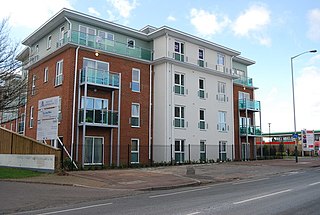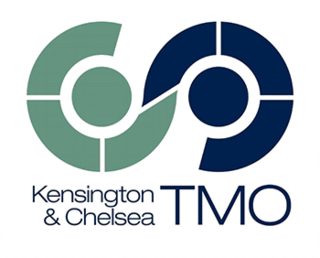Related Research Articles
The Housing Corporation was the non-departmental public body that funded new affordable housing and regulated housing associations in England. It was established by the Housing Act 1964. On 1 December 2008, its functions were transferred to two new organisations, the Homes and Communities Agency and the Tenant Services Authority.

In Ireland and the United Kingdom, housing associations are private, non-profit making organisations that provide low-cost "social housing" for people in need of a home. Any budget surplus is used to maintain existing housing and to help finance new homes and it cannot be used for personal benefit of directors or shareholders. Although independent, they are regulated by the state and commonly receive public funding. They are now the United Kingdom's major providers of new housing for rent, while many also run shared ownership schemes to help those who cannot afford to buy a home outright.

Chiltern District was one of four local government districts of Buckinghamshire in south central England from 1974 to 2020. It was named after the Chiltern Hills on which the region sits.

A housing cooperative, or housing co-op, is a legal entity, usually a cooperative or a corporation, which owns real estate, consisting of one or more residential buildings; it is one type of housing tenure. Housing cooperatives are a distinctive form of home ownership that have many characteristics that differ from other residential arrangements such as single family home ownership, condominiums and renting.
A tenant management organisations (TMO) is an organisation set up under the UK Government's Housing Regulations 1994, which allow residents of council housing or housing association homes in the UK to take over responsibility for the running of their homes.

Octavia Hill was an English social reformer, whose main concern was the welfare of the inhabitants of cities, especially London, in the second half of the nineteenth century. Born into a family of radical thinkers and reformers with a strong commitment to alleviating poverty, she herself grew up in straitened circumstances owing to the financial failure of her father's businesses. With no formal schooling, she worked from the age of 14 for the welfare of working people.
Subsidized housing is government sponsored economic assistance aimed towards alleviating housing costs and expenses for impoverished people with low to moderate incomes. In the United States, subsidized housing is often called "affordable housing". Forms of subsidies include direct housing subsidies, non-profit housing, public housing, rent supplements/vouchers, and some forms of co-operative and private sector housing. According to some sources, increasing access to housing may contribute to lower poverty rates.

The Peabody Trust was founded in 1862 as the Peabody Donation Fund and now brands itself simply as Peabody. It is one of London's oldest and largest housing associations with around 55,000 properties across London and the South East. It is also a community benefit society and urban regeneration agency, a developer with a focus on regeneration, and a provider of an extensive range of community programmes.
In the United Kingdom, an arms-length management organisation (ALMO) is a not-for-profit company that provides housing services on behalf of a local authority. Usually an ALMO is set up by the authority to manage and improve all or part of its housing stock. Ownership of the housing stock itself normally stays with the local authority. As of July 2008, seventy ALMOs were managing over half of all UK council housing, consisting of more than a million properties. This number has since reduced as local authorities have taken services back in-house or stock has been transferred, of 2016 there are 37 ALMOs who manage nearly a third of local authority housing, approximately half a million council and ALMO homes.
The Tenant Services Authority (TSA) was the operating name of the Office for Tenants and Social Landlords, the former regulatory agency of registered providers of social housing in England.
Homes England is the non-departmental public body that funds new affordable housing in England. It was founded on 1 January 2018 to replace the Homes and Communities Agency (HCA).
Southern Housing Group is an among the largest and oldest housing associations in the UK, managing 30,000 homes for over 77,000 residents in London and the south east of England.
The National Tenant Voice (NTV) was a short-lived British government-funded organisation which was set up in early 2010 by Gordon Brown's Labour Government to ensure that Social Housing tenants had a say in shaping national policy on housing issues. The quango was abolished in July 2010 by the new Conservative-Liberal Democrat Coalition government as part of its economic and governmental reforms.

Kensington and Chelsea London Borough Council is the local authority for the Royal Borough of Kensington and Chelsea in Greater London, England. It is a London borough council, one of 32 in the United Kingdom capital of London. Kensington and Chelsea is divided into 18 wards, each electing either two or three councillors. The council was created by the London Government Act 1963 and replaced two local authorities: Kensington Metropolitan Borough Council and Chelsea Metropolitan Borough Council.

Kensington and Chelsea TMO (KCTMO) was the largest tenant management organisation (TMO) in England, managing nearly 10,000 properties on behalf of Kensington and Chelsea London Borough Council – the entire council housing stock in the Royal Borough of Kensington and Chelsea.
A Tenant Panel is an organisation proposed by the British Coalition government to facilitate local residents exercising control over their environment.
Residents, including social housing tenants, want to make big positive differences to their communities – and I want to put the powers in their hands to be able to do so. For too long, when there’s a problem in their area, they have been told to sit tight and wait until action is taken on their behalf. The new powers and skills that tenant panels will bring will instead allow them to take control of their area; putting them at the heart of proposing solutions, and no longer simply putting up with the problems.

The Excalibur Estate is a post-war 1940s housing estate of 189 prefabricated houses in Catford, South London. The estate contains the last sizeable collection of post-war prefabricated houses in the United Kingdom. In 2011, Lewisham Council approved a plan to replace the prefabs with 371 houses, and demolition was scheduled to begin in 2013. English Heritage has granted listed building status to six of the "prefab" houses. The proposed demolition has led to campaigns from residents, English Heritage and the Twentieth Century Society to save the properties, and a legal challenge to prevent redevelopment if they are demolished and return it to parkland.
Corporate Watch is a research group based in the UK. It describes itself as a "research group that helps people stand up against corporations and capitalism." And as a "not-for-profit co-operative providing critical information on the social and environmental impacts of corporations and capitalism." It was established in 1996.

Public housing provided the majority of rented accommodation in the United Kingdom until 2011 when the number of households in private rental housing surpassed the number in social housing. Houses and flats built for public or social housing use are built by or for local authorities and known as council houses, though since the 1980s the role of non-profit housing associations became more important and subsequently the term "social housing" became more widely used, as technically council housing only refers to housing owned by a local authority, though the terms are largely used interchangeably. Before 1865, housing for the poor was provided solely by the private sector. Council houses were built on council estates, where other amenities, like schools and shops, were often also provided. From the 1950s, blocks of flats and three-or-four-storey blocks of maisonettes were widely built, alongside large developments of terraced housing, while the 1960s and the 1970s saw construction of many high-rise tower blocks. Flats and houses were also built in mixed estates.

The National Communities Resource Centre (NCRC) is a British charity which was set up in 1991 to offer support and training to residents in low-income areas. It runs courses for tenants and community groups from its premises near Chester. Since 2020 it has been part of Regenda Group, a company which provides and operates affordable housing.
References
- ↑ "TAROE Information Sheet" (PDF). TAROE. Retrieved 20 August 2013.
- ↑ "TAROE and Mears set up tenant body", Inside Housing, 25 February 2011, archived from the original on 6 March 2016